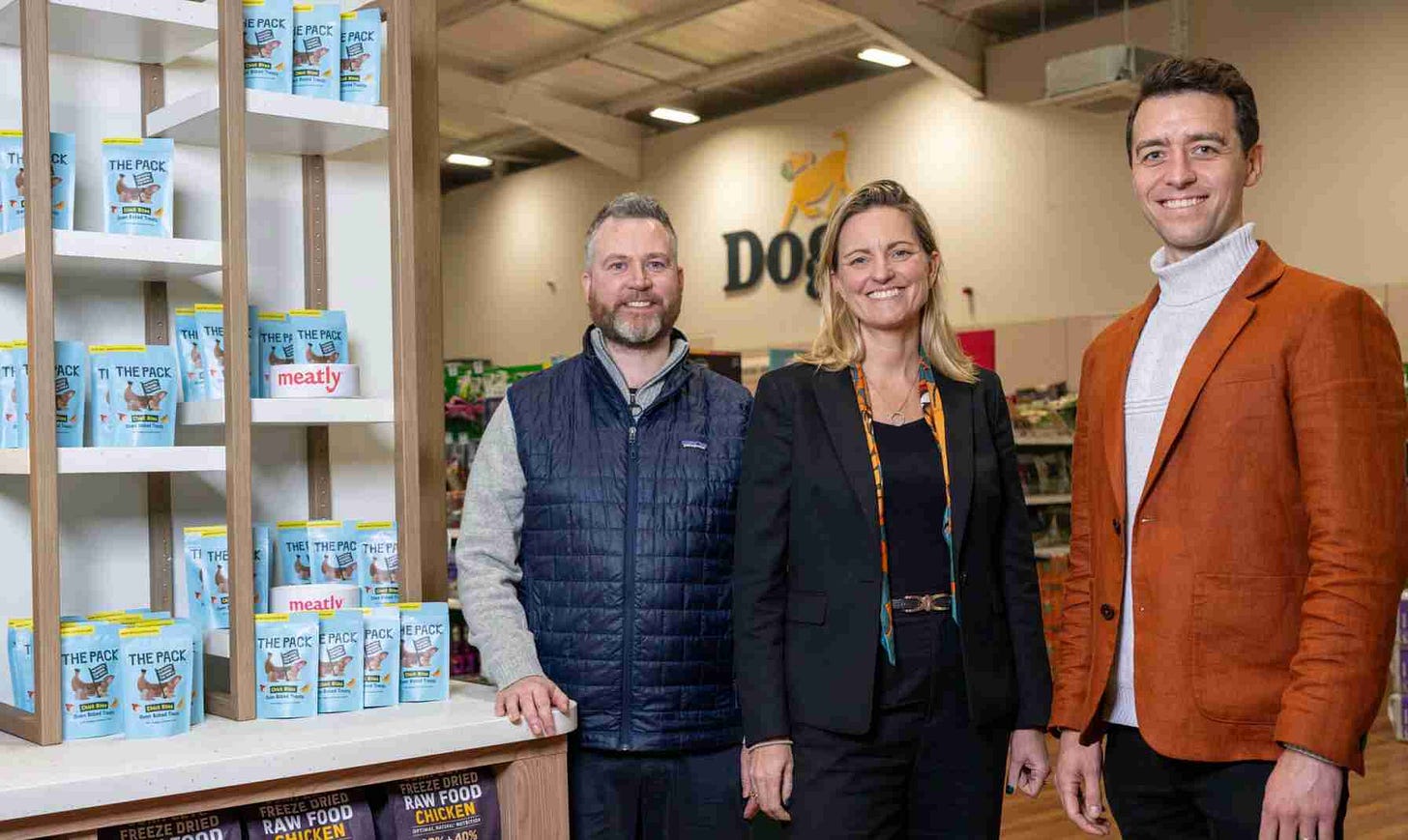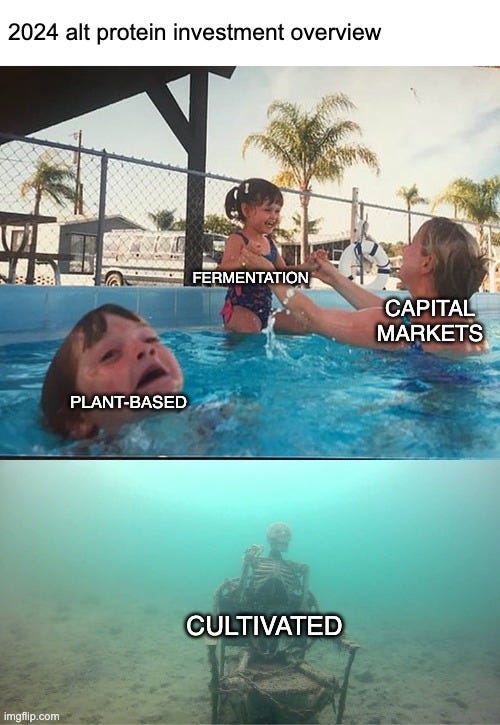World’s First Cultivated Pet Food Launch, Alt Protein’s $1.1B Year, and €12M for Next-Gen Biomanufacturing
Also: Mosa Meat seeks Swiss approval for its cultivated beef fat after surpassing a €1.5M crowdfunding goal in 24 minutes.
Better Bioeconomy turns 2! 🥳
Two years ago, I hit send on the first issue of this newsletter. Crazy. That’s 91 issues, many thousands of words, and a growing community of readers who care about building a climate-friendly food system.
A huge thank you for the support, whether you’ve been here for a while or just joined. Here’s to another year of learning, discoveries, and (hopefully) impact! 🙏🏾
If you’re working on solutions for sustainable food systems, I’d love to connect. I started this newsletter to meet folks with similar interests, so feel free to reach out to chat on LinkedIn or hop on a call—I’m always happy to discuss ideas and opportunities! 🙂
Let’s dig into the latest updates on the intersection of biotech and agrifood!
BIO BUZZ
Products, partnerships, and regulations
🇬🇧 Meatly introduced cultivated chicken at Pets at Home in the UK, becoming the world’s first company to sell cultivated pet food
The product, named Chick Bites, mixes cultivated chicken with plant-based ingredients from the vegan pet food startup The Pack, and it retails for £3.49 per 50g pouch.
The initial production of 750 packs is a test phase, sold exclusively at Pets at Home’s (one of Meatly’s largest investors) Brentford store, the UK’s largest pet retailer with over 450 locations. Meatly aims to scale production over the next 3-5 years and collaborate further with Pets at Home and The Pack.
The London-based startup’s cultivated chicken is grown from a single sample of chicken cells. It provides all essential nutrients while being more sustainable than traditional meat sources. Feeding trials showed that 50% of dogs licked their bowls clean, and 75% of pet owners noticed increased enjoyment.
Source: Green Queen
🇳🇱🇨🇭 Mosa Meat applied for approval in Switzerland for its cultivated beef fat just after surpassing its crowdfunding goal of €1.5M in 24 minutes
Switzerland's approval process is expected to be quicker than the EU’s (to which Mosa Meat applied a couple of weeks back) because it does not require a committee vote. Bell Food Group, Switzerland’s largest meat processor, is supporting the application, which is expected to take 18 months.
The ongoing crowdfunding campaign has exceeded expectations. Within two days, it was overfunded by 175%, reaching €2.65M from over 1,110 investors, with the largest single investment being €1M. The Crowdcube campaign will close on February 25 or earlier if it reaches €13M in funding.
The Dutch company opted for crowdfunding due to overwhelming consumer interest in supporting the company's mission. The funds will be used for final R&D, marketing, and preparing for the first restaurant sales.
Source: Green Queen
🇮🇱 Israel's largest beverage manufacturer entered a 10-year partnership with Brevel to develop microalgae-based functional drinks and dairy alternatives
The Central Bottling Company (CBC), Israel's largest beverage manufacturer, had already invested in Brevel during its $18.5M seed funding round (2023). Brevel uses a unique light and sugar fermentation process to cultivate microalgae in indoor bioreactors without genetic modification.
Brevel’s microalgae, derived from the Chlorella family, is rich in protein (60-70%), lipids, fibre, and pigments. It has already been classified as safe for consumption by both the FDA (GRAS system) and the EU's novel foods list.
The extracted protein is a white powder with a full amino acid profile. It can be used in meat and dairy analogues, enhancing the taste, texture, and functionality of plant-based foods.
Source: Green Queen
🍗 Stämm and SuperMeat collaborate to enhance cultivated chicken production using Stämm’s continuous bioprocessing technology
Stämm's Bioprocessor, a bubble-free automated bioreactor, has shown a 15x increase in volumetric productivity and cost reductions in biologics manufacturing.
The Bioprocessor is now being tested for muscle fibre growth and structured meat production. Integrating Stämm’s technology is expected to improve SuperMeat’s efficiency, allowing for structured whole-cut cultivated meat products.
The collaboration will measure cost efficiency and scalability to develop economic models for large-scale cultivated meat facilities, particularly in culture media utilization and biomass production.
Source: vegconomist
🇯🇵 Over 35% of Japanese consumers are aware of and willing to try cultivated eel, with 25% eager to taste it regardless of price
These results come from a recent survey of 2,000 individuals conducted by Forsea Foods, an Israeli startup recognized for creating the “world’s first” cell-cultured eel, initially aiming at the Japanese market.
Japan consumes 50-70% of the global eel supply, with 10% of consumers eating it regularly despite wholesale prices of $40-60 per kg. Premium eel can sell for over $120 per kg.
In a separate August survey, more than a third of consumers worried about overfishing, which has made freshwater eel critically endangered. 23% avoided it due to its high costs. Nearly a third believe cultivated eel is safer and more nutritious, while two in five think it could help combat overfishing.
Source: Green Queen
⚡️ More buzzes
🇮🇹 Italian startup KelpEat has launched a high-protein snack made with Solein, a microbial protein from Finnish company Solar Foods, and EU-farmed seaweed. The crackers contain more than 35% protein, a complete amino acid profile, and essential nutrients, including vitamins B12, calcium, and antioxidants. (vegconomist)
🇩🇪 The Cultivated B introduced a real-time AI-powered biosensor system for cell culture and fermentation monitoring. The multi-channel sensors detect molecules like glucose, amino acids, and lactic acid at concentrations below the picomolar level. This reduces manual sampling and contamination risks. (vegconomist)
BIO BUCKS
Funding, M&As, and grants
🌏 Alt protein companies raised $1.1B in 2024, with the fermentation sector seeing a significant funding increase
This brings cumulative investments since 2015 to $18.6B. Of the $18.6B total funding, $16B went to private companies, while $2.5B was raised by publicly traded companies.
Overall year-over-year alt protein investments fell 29% in 2024, but private company investments increased by 4%. In 2024, publicly traded companies received less than $200,000.
Compared to 2023, investments in plant-based proteins declined to $309M, fermentation companies increased to $651M, and cultivated meat and seafood declined to $137M.
Source: Good Food Institute
🇩🇰 Enduro Genetics raised €12M Series A funding to expand its biomanufacturing technology that ‘addicts’ cells to high production
Traditional bioreactors suffer from inefficiencies, with as few as 15-20% of cells producing the target product. Many cells stop production over multiple generations (60-80), leading to economic and production losses.
The Danish startup’s ‘Enduro Sense’ technology is a genetic biosensor that forces cells to keep producing the target by linking their survival to their productivity. If they stop making the target product, they also lose the ability to survive. This improves yields by >30% and extends fermentation time by 5x.
The technology integrates at the master cell bank-level without altering production media or processes. As a result, clients can increase output without increasing input, avoiding capital expenditures on larger bioreactors.
💰 Investors: Supernova Invest, NOON Ventures, and Sandwater.
Source: AgFunder
🇪🇺 GreenLight Biosciences España secured €35M loan from the European Investment Bank to advance RNA-based biocontrol solutions
GreenLight’s RNAi-based biocontrols offer three main advantages: selective pest targeting, environmentally friendly degradation, and resistance-free pest control, making them a promising alternative to traditional pesticides.
The EIB’s loan will accelerate the research and development of 10 new biocontrol products, focusing on potato pests, fungal diseases in fruits and vegetables, and honeybee health.
This funding, supported by InvestEU, contributes to the EU’s goal of mobilizing €372 billion in public and private investments between 2021 and 2027. The initiative prioritizes agriculture, bioeconomy, and sustainable innovation.
Source: European Investment Bank
🇺🇸 Heritable Agriculture spun out from Google’s X, secured funding for AI-driven biotech platform for crop improvement
Originally incubated in Alphabet’s moonshot factory, Heritable Agriculture has become an independent company focused on AI-driven plant breeding and biotechnology to enhance food and agricultural resilience.
The platform makes plants "programmable," enabling faster and more cost-effective breeding cycles. The goal is to boost crop yields, improve nutritional value, and enhance plants' resilience against climate stress and pathogens.
Heritable optimizes plant traits by combining AI with multi-omics data, predictive breeding, and gene editing. The platform offers three core services: identifying key genes, designing genetic edits, and predicting plant behaviour in specific environmental and management conditions.
💰 Investors: FTW Ventures, Mythos Ventures, and SVG Ventures
Source: Business Wire
🇧🇪 BiocSol raised €4.4M, including a mix of equity and non-dilutive funding, to advance its microbial-based biopesticides
This follows the Belgian startup's €5.2 million funding round in late 2024. The funds will support BiocSol’s R&D platform development and help demonstrate proof of concept for its first two biofungicide products.
Founded in 2023 as a UCLouvain spin-off, BiocSol develops microbial-based biopesticides that protect various crops, including potatoes, vegetables, and grapes, from issues like mildew.
The company addresses a critical agricultural challenge where fungal and oomycete pathogens are responsible for destroying 20-40% of annual crop yields globally.
💰 Investors: Pymwymic, Agri Investment Fund, and VIVES Partners
Source: Tech Funding News
GEEK ZONE
Scientific research papers
🍌 Iron-rich nanoparticles and light work together to stimulate yeast metabolism to increase ethanol production from banana peels
The study found that adding 100 ppm of cobalt ferrite (CoFe₂O₄) nanoparticles to Saccharomyces cerevisiae (yeast) fermentation of banana peels increased bioethanol yield from 11.16% to 52.16%.
When these nanoparticles were photoactivated with visible light, ethanol production further increased to 63.01%, showing a strong synergy between nanomaterials and light exposure.
Iron and cobalt in CoFe₂O₄ nanoparticle nanoparticles likely enhance yeast metabolic activity by acting as cofactors in enzymatic processes. These nanoparticles accelerate fermentation rates, allowing more efficient ethanol production from food waste.
Source: Current Microbiology
🌾 Beneficial microbes increased wheat yield by more than 60% under reduced fertilizer conditions
A plant growth-promoting rhizobacteria (PGPR) consortium increased wheat yields by 30.71% and 25.03% in season one and 63.92% and 58.45% in season two under reduced fertilizer conditions.
When applied alone, Lysinibacillus sphaericus (T19) increased wheat yield by 9.33% and 16.22% in seasons three and four but decreased yield by 33.39% in season five. Paenibacillus alvei (T29) had mixed effects, increasing yield in seasons three and five but decreasing it by 21.15% in season four.
Whole genome sequencing identified genes linked to nutrient cycling, pathogen suppression, and stress regulation, explaining PGPR's effectiveness in improving yield.
Source: Folia Microbiologica
🦠 Marine-derived bacteria offer natural compounds that can suppress rice blast fungus
A strain of Pseudomonas aeruginosa R64 in mangrove soil shows strong antifungal effects against Pyricularia oryzae, the fungus that causes rice blast. The strain’s fermentation extract (RFE) effectively inhibits fungal growth, spore production, and infection structures, reducing disease severity.
The main active ingredients in RFE are phenazine-1-carboxamide (PCN) and phenazine-1-carboxylic acid (PCA), with PCN being the most effective. PCN was better at suppressing fungal growth than the chemical fungicide tricyclazole but slightly less effective than isoprothiolane.
RFE disrupts fungal cell walls, damages membranes, and interferes with the pathogen's ability to infect plants. It prevents spores from germinating and stops the formation of appressoria, the structures fungi use to penetrate host plants.
Source: Pest Management Science
EAR FOOD
Podcast episode of the week
🎧 How AI-driven biotech revolutionizes food production
Guest: Dr. Jeremy Agresti, CTO and Founder of Triplebar
Large-scale data generation is the missing piece in AI for biology: Unlike language models that use vast amounts of online text, biological data remains relatively scarce. Triplebar’s proprietary platform creates targeted datasets that improve AI predictions in biotech, addressing a key gap in food and health.
A new biotech supply chain model: Instead of each alt protein startup reinventing the wheel with its own microbes, Triplebar envisions a supply chain where companies source optimized biological components, similar to how industries use specialized suppliers (e.g., Goodyear provides tyres instead of making cars).
Overcoming key bottlenecks in cellular agriculture: The challenge of growing animal cells in bioreactors limits cultivated meat production. Triplebar uses evolutionary selection and AI modeling to develop better cell lines and microbes, enhancing growth conditions and lowering costs of growth media.
Thank you for reading! 🙏🏾
Want to reach an engaged, highly niche audience of more than 1,500 biotech x agrifood enthusiasts? If you are exploring sponsorship opportunities, reach out at eshansamaranayake@gmail.com or simply reply to this email.
Enjoyed this issue? Let me know how you think I can improve!
If the newsletter brought you value, please consider sharing it with a friend who might benefit, or making a small pledge to acknowledge the hours behind each issue. Thank you for reading and supporting my work!






Whoo hoo Eshan! Congratulations on the Better Bioeconomy two year anniversary! Way to go! Issue #91 is a wonderful way to mark the fabulous occasion! Excellent issue. I went to the Meatly website and got on their mailing list so I can be informed when I can buy their Chicken Bites for my animals. The article on Japanese people being accepting to alt protein got me to think that people have no trouble eating imitation crab meat, so why not try alt protein? I liked your Sponge Bob gif! Very cool 😎. Thanks for keeping the community up to speed on the latest and greatest developments in the space. We all appreciate the hard work and efforts you put into each issue. I'm sending you positive thoughts and good vibrations for a wonderful week ✨️ ❤️
Congrats on 2 years!